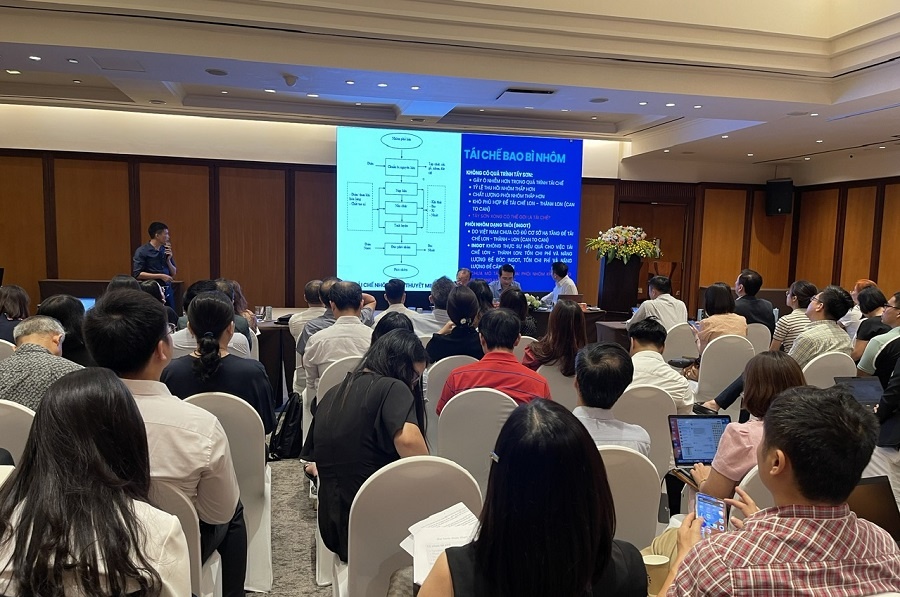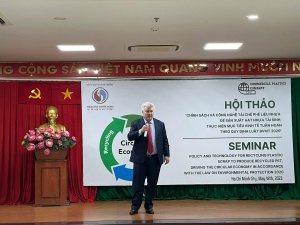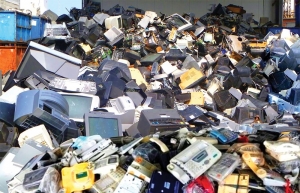Businesses recoil at high recycling costs
 |
| Businesses recoil at high recycling costs (Workshop scene) |
At last week’s recycling workshop held by the Vietnam Chamber of Commerce and Industry and the Ministry of Natural Resources and Environment in Hanoi, Chu Thi Van Anh, vice chairman of the Vietnam Beer-Alcohol-Beverage Association (VBA), expressed the concerns of its member companies about the issue.
“The recycling costs for a unit volume of product and packaging proposed in the draft is problematic, especially as consultation studies have shown differing results. The new fees might not be suitable for the situation in Vietnam. For example, costs for aluminium packaging are VND6,180 (27 US cents) per kg, nearly five times higher than the average of other countries. The high rate could lead to higher consumer and producer prices,” she said.
Anh added that the proposed costs did not follow the principle of circular economy because they did not deduct the value of recovered materials. Many materials with high recovery value such as aluminium, paper packaging, and hard plastic bottles have been almost completely recycled and have no risk to the environment.
“Recyclers already make profit from this. Therefore, it is not reasonable to ask manufacturers to contribute to support such profitable recyclers. For materials with low recovery and recycling value, such as plastic bags, mixed paper packaging which are less recycled because of losses, and high risks to the environment, it is necessary for manufacturers to contribute to support recyclers.”
The new fees attempt to create a reasonable and valid rate of recycling costs for a unit volume of product and packaging and administrative costs to support the implementation of waste collection and treatment responsibilities of manufacturers and importers.
According to last year’s Decree No.08/2022/ND-CP, guiding the Law on Environmental Protection 2020, the Ministry of Natural Resources and Environment has submitted specific costs to the prime minister for each type of product and packaging, to be adjusted every three years.
Alongside VBA members, other business associations and domestic and foreign-invested enterprises have voiced their concern over the fees. Phan Thi Bich Hanh, a representative of the American Chamber of Commerce in Vietnam (AmCham), said that many American businesses have pioneered in this field. However, the proposed fees were still unreasonable.
“Specifically, the proposed fees for mixed paper packaging are 4.3 times higher, and aluminium is 4.9 times higher than the average of other countries. This very high recycling rate will lead to unreasonably high prices of goods, causing difficulties for both producers and consumers,” she said.
The AmCham representative blamed unreasonably high fees on the fact that they do not follow the circular economy principle, as the value of the recovered materials is not deducted. She cited the Organisation for Economic Co-operation and Development’s Environmental Research Report from October 2021 that said, “It is necessary to work on fee adjustment programmes to ensure the full recovery of operating costs.”
According to the principle of circular economy, for packages and products where the value of recovered materials is higher than the cost of recycling, the coefficient fees must be zero as experienced in advanced countries such as Denmark, Norway, and others.
In addition to the rate of recycling cost, administrative costs have also attracted attention among the business community, with many saying that such costs are not unreasonable.
According to the draft, administrative expenses for managing, supervising and supporting the implementation of waste collection and treatment responsibilities of manufacturers and importers should be 3 per cent deducted from financial contribution to support waste treatment.
“The administrative cost of 3 per cent is inconsistent with the Law on Environmental Protection 2020. The administrative cost in the draft is a huge amount of money. According to our internal survey with large beverage businesses in the VBA, the volume of products that businesses have to recycle is about 700 million kg a year. The administrative expenses of our members alone will be $4.75 million per year,” said Anh of the VBA.
Hanh from AmCham suggested removing the administrative cost of 3 per cent because the rate was too high for businesses.
Businesses also proposed flexibility in application and supporting policies to enable them to contribute more to the country’s effort in environmental protection as well as promoting green economy, and circular economy.
Nguyen Vui, recycling project manager of Phu Thai CAT under Phu Thai Group, said, “They should reconsider the recycling fees to encourage manufacturers and importers, and have incentives policies to encourage them to extend and share their recycling responsibilities.”
Tran Van Hieu, vice director of Lagom, said, “The fees should be flexible and have more options instead of having just two options - manufactures themselves carrying out the recycling, or having to pay for recyclers. For example, the law should also allow manufacturers to combine the two to ensure affordability and business operation scale.”
 | Seminar held on recycling plastic waste Responding to World Environment Day 2023, the Centre of Natural Resources and Environment Communications, under the Ministry of Natural Resources and Environment, held a seminar on May 18 on policy and technology for recycling plastic scrap to produce recycled PET, while driving the circular economy. |
 | E-waste recycling costs unsettle FIEs Many foreign-invested manufacturers are concerned about the high recycling costs of electronic waste, which could create a significant financial burden for their businesses and potentially lead to increased product prices for consumers. |
What the stars mean:
★ Poor ★ ★ Promising ★★★ Good ★★★★ Very good ★★★★★ Exceptional
 Tag:
Tag:
Related Contents
Latest News
More News
- Ho Chi Minh City launches plan for innovation and digital transformation (February 25, 2026 | 09:00)
- Vietnam sets ambitious dairy growth targets (February 24, 2026 | 18:00)
- Masan Consumer names new deputy CEO to drive foods and beverages growth (February 23, 2026 | 20:52)
- Myriad risks ahead, but ones Vietnam can confront (February 20, 2026 | 15:02)
- Vietnam making the leap into AI and semiconductors (February 20, 2026 | 09:37)
- Funding must be activated for semiconductor success (February 20, 2026 | 09:20)
- Resilience as new benchmark for smarter infrastructure (February 19, 2026 | 20:35)
- A golden time to shine within ASEAN (February 19, 2026 | 20:22)
- Vietnam’s pivotal year for advancing sustainability (February 19, 2026 | 08:44)
- Strengthening the core role of industry and trade (February 19, 2026 | 08:35)






















 Mobile Version
Mobile Version